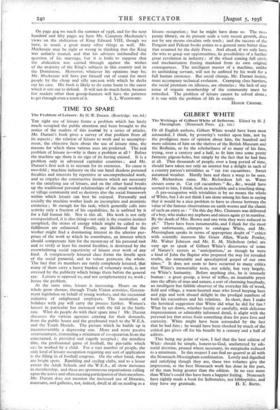GILBERT WHITE OF all English authors, Gilbert White would have
been most astounded, I think, by posterity's verdict upon him, not by the prodigious mass of opinion about him, the hundred and more editions of him on the shelves of the British Museum and the Bodleian, or by the scholarliness of so many of his fans, trying, over a century and a half, to fit him into some pretty fantastic pigeon-holes, but simply by the fact that he had fans at all. That thousands of people, over a long period of time, should have taken not only an interest but a delight in such of a country parson's trivialities as " cut too cucumbers. Sweet autumnal weather. Hardly here and there a wasp to be seen. Mr. Richardson came. Mr. Richardson left us. Water creases come in. Cut 158 cucumbers " &c., &c., would have seemed to him, I think, both an incredible and a touching thing.
A pre-occupation with trivialities is by no means the whole of White, but I do not think I am alone among his fans in saying that it would be a nice problem to have to choose between the value of the famous observations on earth worms and the cbarin of such an entry as : " On this day Mrs. Clements was delivered of a boy, who makes my nephews and nieces again 57 in number. By the death of Mrs. Brown and one twin they were reduced to 56." There have been innumerable, and I think for the most part unfortunate, attempts to catalogue White, and Mr. Massingham speaks in terms of appropriate doubt of " critics with scientific interests like' Grant Allen, Warde Fowler,. Mr. Walter Johnson and Mr. E. M. Nicholson (who) are very apt to speak of Gilbert White's discoveries of some of Nature's secrets as ' anticipations,' as though' he were a kind of John the Baptist who prepared 'the way for reiealed truths, the immutable and apocalyptical gospel of our own times." It does not seem to have occurred to many critics that White's immortality rests, not solely, but very largely, on White's humanity. Before anything else, he is intensely human : a great gossip, a lover of trifles, an insatiable pryer into the affairs of man and nature, a sort of charming busybody, an intelligent but fallible observer of the everyday life of wood, field and village, a warm-hearted man who loved keeping bees and pigs and took absurd delight in the prodigal numbers of both his cucumbers and his relations. In short, dare I make the heretical suggestion that White did what he did for fun ? What he set down, whether hastily or carefully, with delicious impressionism or admirably informed detail, is alight with the personal joy that arises from something done for pure love and curiosity. White might have been astounded by the fact that he had fans ; he would have been shocked by much of the critical gas given off for his benefit by a century and a half of editors.
This being my point of view, I feel that the best edition of Whin should be simple, honest-to-God, uncluttered by edi- torial doctrine, pruned where necessary, its marginalia reduced to a minimum. In this respect I can find no quarrel at all with the Nonesuch-Massingham combination. Lovely and dignified and satisfying though they are, these two volumes give the impression, as the best Nonesuch work has done in the past, of the man being greater than the edition. In no case more than White's could this have been a happier feeling. Nonesuch have rightly made a book for Selbornites, not bibliophiles, and they have my gratitude. H. E. BATES.


































 Previous page
Previous page